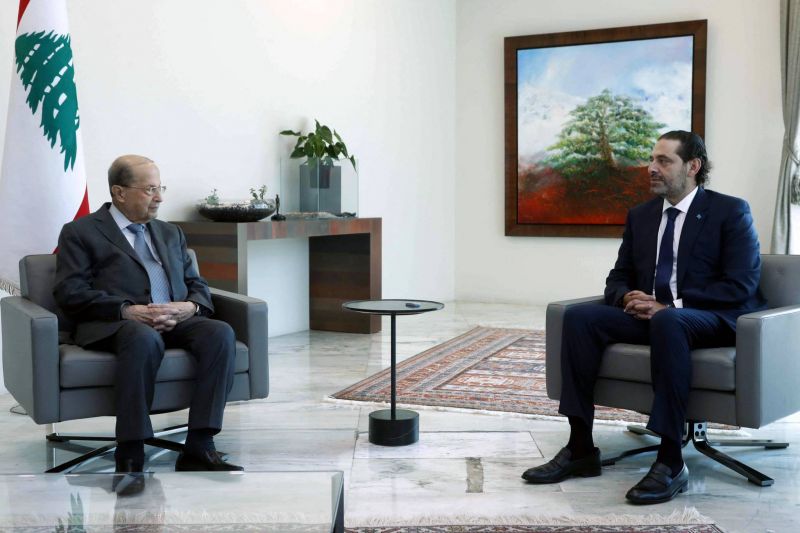
Aoun and Hariri met at the Presidential Palace in Baabda on Wednesday. (Credit: Dalati and Nohra)
Want to get the Morning Brief by email. Click here to sign up.
Saad Hariri presented a cabinet lineup to the president amid speculation the premier-designate is considering stepping down if the government formation deadlock persists. “I presented to President Aoun a government of 24 specialist ministers … and I hope for an answer from Aoun tomorrow,” Hariri said from the Presidential Palace in Baabda yesterday following a meeting with Michel Aoun. The meeting, during which Hariri presented the lineup proposal, appears to be a last-ditch effort by the premier-designate to break a nine-month stalemate with the president. The impasse is reportedly due to a disagreement about how the cabinet portfolios should be divided by sect, with Hariri claiming that Aoun is jockeying to obtain veto power for him and his allies. The president denies this. Should Hariri resign, he would be the second prime minister-designate to pull out of government formation negotiations in the 11 months since Hassan Diab’s cabinet resigned in the wake of the Beirut port explosion.
Amnesty International called on authorities to lift immunity for officials summoned by Judge Tarek Bitar in relation to the blast investigation. “We stand with these families in calling on Lebanese authorities to immediately lift all immunities granted to officials, regardless of their role or position. Any failure to do so is an obstruction of justice, and violates the rights of victims and families to truth, justice and reparations,” Lynn Maalouf, Amnesty’s deputy director for the Middle East and North Africa, said in a statement. The statement comes a day after victims’ families were beaten and tear gassed while protesting outside the house of caretaker Interior Minister Mohamed Fehmi, who had reneged on a promise to allow Bitar to question General Security head Abbas Ibrahim. Fehmi doubled down on his decision in comments published Wednesday, claiming that any alternative “is illegal.” Later Wednesday, scattered demonstrations against Fehmi’s decision took place by victims’ families. Meanwhile, a parliamentary committee is set to decide whether to lift immunity from three MPs and former ministers who are also subjects of the investigation — Nouhad Machnouk, Ghazi Zeaiter and Ali Hassan Khalil — within the next two weeks.
Meanwhile, the president exceptionally approved a decree to establish Aug. 4 as a national day of mourning. Caretaker Prime Minister Hassan Diab had approved the measure back in June. However, the president’s gesture rings hollow, given that — almost a year after the Beirut port explosion — he has yet to meet in an official capacity with the families of the victims of the blast, which killed more than 200 people and wounded thousands. This is due to scheduling issues, a Presidential Palace source previously told L’Orient Today.
Fuel prices rose yet again yesterday, reflecting about a two-thirds price increase for motor fuel and diesel since the end of June. Twenty liters of 95-octane gas now cost LL73,300; of 98-octane gas, LL75,400; and of diesel, LL56,500. A household gas cylinder now costs LL51,500 — a more than 80 percent price hike over the same period. Residents have faced sharp increases since the government announced a partial end to fuel subsidies, reimbursing importers at a rate of LL3,900 to the US dollar instead of the official LL1,507.5 rate. Although officials nominally took the decision to assuage fuel shortages during the summer months, lines at gas stations are still ubiquitous, and daily blackouts are leaving residents without electricity as private generator owners struggle to find diesel to power their generators.
Some three-quarters of people who menstruate are having difficulty accessing period products, a survey released yesterday found. The survey, conducted by the feminist collective Fe-Male and the NGO Plan International, found that 42 percent of 1,800 women and girls interviewed had either reduced the number of pads used during their periods or used them for a longer time, which can increase the risk of infection. A third of the respondents had experienced physical distress after changing their products, such as allergies and infections, and 43 percent reported feelings of anxiety and stress. Nearly 90 percent had changed their purchasing behavior for menstrual products because of price increases. Worsening period poverty comes against a backdrop of soaring inflation, with year-over-year inflation clocking in at 120 percent as of the end of May.